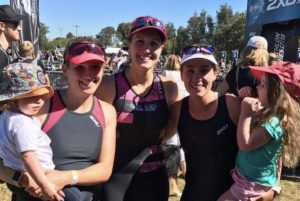Every time we talk about Triathlon, we generally only think of the athlete who is competing. Much of the attention goes to the individual who crosses the finish line, takes the medal, and gets the photos. It rarely goes to those who have supported the athlete in their journey.
Behind every great athlete, there is always a partner, a family, a coach, and a team supporting and helping them along every step of their journey. As we approach Melbourne 70.3 in November, the athletes racing are nearing the end of their half ironman training program. We will take the opportunity here to highlight the multitude of roles and responsibilities of those who work behind the scenes to make everything go right for the athlete on race day.
The role of the support crew starts the same day the athlete signs up for a big race. The support crew will begin to accommodate their own schedules to suit the athlete’s. They will start to identify every detail that needs to be in place for everything to go smoothly. From nutrition to the specific gear that needs to be used every day for training and work. The race becomes part of an everyday dynamic between all involved and it soon becomes part of the routine.
Depending on the event, the role of the support crew is one of endurance as much as it is for the athlete. If we are talking about a Sprint Triathlon and their significant one is a Professional Athlete, then the wait isn’t longer than an hour tops. But the longer the distance and the harder the event, the crew needs to be prepared for longer and longer wait times.
Here are some of the main roles that support crew has:
- Nutrition: Understanding what the athlete needs to eat, and when and how often they need to eat. They learn the importance of protein, carbs, hydration, and timing of meals.
- Emotional support: Not only during race day, but when training sessions go wrong or when a week doesn’t go as expected. They handle the sadness, frustration, and anxiety that the athlete has around the sport.
- Clothing Expert: They understand the huge pile of washing every week. The training props filling the cupboards. The trips to the team store to buy new gear as old gear wears thin. They understand that runners are only supposed to last 400-500km, and there may only be a couple of months between new pairs.
- Course Expert: The Support crew might end up knowing the course better than the main athlete. They suss out the best spots for viewing and cheering. They will know what time and where the athlete will be on course.
- Gear: They understand that training consistently in three sports requires a lot of gear. There’s bike lights, watches, computers, chargers, pool toys, sunnies, hats, gloves, sunscreen, nutrition and more. The support crew knows where it all is and what days it will be needed.
- Alarm Clock: Sometimes the athlete needs someone to kick them out of bed to start their training. What could be better than the kick coming straight from the other side of the bed?
- Coach: The coach is the conductor of the orchestra of training. Ensuring the right style of session and the right durations to meet the athletes goals and life balance. Changing and adapting to the athletes work and family life, sleep patterns and moods.
These are just some of the roles that the athlete’s support crew does during the preparation phase. When race day comes, it is a whole different story because they will have their own personal checklist aside from the athlete’s. Support crew’s need to be ready to withstand the elements on race day for hours and hours to see and cheer on the athlete.
Support Crew Race Day Checklist:
- Support: The number one thing the support crew needs to do on race day is support! To be the best at this, they will need course maps, pom poms, signs, cow bells, motivational words and a big set of lungs.
- Nutrition and hydration: As support crew, you may be waiting for the athlete for many, many hours depending on the race distance. Staying hydrated and eating well is very important.
- Things to pass the time: From a videogame to a good book. Once again, it can be hours and hours before the athlete comes by. Make sure you have something to do to pass the time, especially if you have young kids in tow.
- Extras: Sunscreen, foldable chair, umbrella, hat and a whole bag full of gear to help protect you from the elements.
The support crew might not be the ones training or racing, but it doesn’t mean that they don’t put the hard work in. On the long sessions and the early mornings to the late nights and the logistics ahead of race day, the support crew are there to help the athlete achieve their dream. The day the athlete runs their big race, they will need to think of everyone who has been there for them as they cross the finish line. Their support crew deserve the achievement as much as they do.
Finally, on behalf of every athlete and to every person who has been support crew at some point, thank you, it wouldn’t be the same without all of you.

